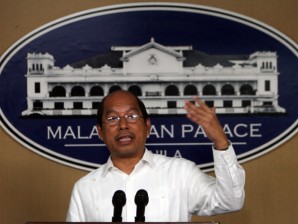The Palace will still pursue the passage of the Freedom of Information (FOI) bill although it has come up with a four-year plan to make the government more transparent and accountable as well as capable of fighting corruption.
The Aquino administration’s good governance and anticorruption plan from 2012 to 2016 was presented to the media Tuesday by Budget Secretary Florencio Abad shortly after it was approved by President Benigno Aquino III when it was submitted to him Tuesday.
Abad told reporters the plan was created as part of the campaign vow of President Aquino of good governance and leading the fight against corruption.
“The objective of the good governance and anti-corruption cluster is to make sure the corruption problem is curbed and public services get to citizens and to enhance the economic environment,” Abad said in a press briefing.
Under the plan, the government will take up three initiatives—transparency, accountability and engagement of citizens, according to the budget secretary.
For instance, Abad said in promoting transparency, the government would make sure there would be “sufficient disclosure” of its operations such as requiring all 24 departments to comply in disclosing budget information.
At present, only 17 percent comply in disclosing their budget information while 73 percent partially comply.
Asked whether this meant then that the FOI bill would be done away with because of the transparency policy being put in place under the plan, Abad said no.
He said the plan actually was “setting the ground and laying the foundation of a meaningful FOI law.”’
“Because even if we pass a law today, I don’t think meaningfully citizens can take advantage of a policy that allows FOI,” Abad said.
He disclosed that during the meeting with the cluster Tuesday, President Aquino asked Undersecretary Manolo Quezon to a meeting next week so they could discuss the status of the FOI bill, which remains pending in Congress.
Abad underscored the importance of a law on FOI, saying that given the tendency of new administrations to change government policy, legislation would be able to provide stability and permanence to a policy.
“(The FOI) will still be pursued. The President has expressed interest in the law,” he said.
On the anticorruption plan, the government wants a speedy resolution of cases, according to Abad.
“What we want to do is make sure the process of investigation to prosecution and conviction is shortened,” he said, noting that such processes tended to take a long time.
Abad also said that corruption cases against former President Gloria Macapagal Arroyo was not discussed at the meeting but added that the measures under the plan would “help us prosecute those cases faster and inform the public” about it.
